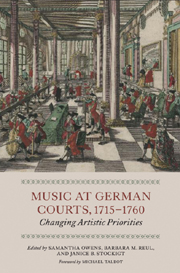Book contents
- Frontmatter
- Contents
- List of Tables
- Foreword
- Preface
- Editorial Notes
- Notes on Contributors
- List of Abbreviations
- 1 ‘Das gantze Corpus derer musicirenden Personen’: An Introduction to German Hofkapellen
- KINGDOMS AND ELECTORATES
- DUCHIES
- PRINCIPALITIES AND PRINCE-BISHOPRICS
- LANDGRAVIATES AND MARGRAVIATES
- Index
1 - ‘Das gantze Corpus derer musicirenden Personen’: An Introduction to German Hofkapellen
Published online by Cambridge University Press: 12 September 2012
- Frontmatter
- Contents
- List of Tables
- Foreword
- Preface
- Editorial Notes
- Notes on Contributors
- List of Abbreviations
- 1 ‘Das gantze Corpus derer musicirenden Personen’: An Introduction to German Hofkapellen
- KINGDOMS AND ELECTORATES
- DUCHIES
- PRINCIPALITIES AND PRINCE-BISHOPRICS
- LANDGRAVIATES AND MARGRAVIATES
- Index
Summary
WHAT WAS MUSICAL LIFE at German courts really like during the first six decades of the eighteenth century? Securing a permanent post in a court music establishment could mean job security, as well as a steady income and a host of other benefits – such as Johann Sebastian Bach and Georg Philipp Telemann had enjoyed in Weimar and Köthen and in Eisenach respectively prior to their appointments in the Freie Reichstädte (Imperial Free Cities) of Leipzig and Hamburg. And yet despite the fact that the political landscape of what we now call Germany featured countless small-to-medium-sized courts similar to those experienced first-hand by Bach and Telemann, general music histories tend to focus on the Hofkapellen of Berlin and Dresden, primarily because of an interesting connection to the Thomaskantor and his oeuvre.
In his pioneering study of court society during the early modern period, the sociologist Norbert Elias noted that the term ‘court’ changed its meaning depending on the period. Different types of court emerged in the German-speaking lands of the Holy Roman Empire during the seventeenth and early eighteenth centuries; the historian Volker Bauer has categorized these as the ‘zeremonieller Hof’ (ceremonial court), the ‘geselliger Hof’ (sociable court), the ‘Musenhof’ (court of muses), the ‘Kaiserhof'’ (imperial court), and the ‘hausväterlicher Hof’. Similarly, John Spitzer and Neal Zaslaw have concluded that ‘orchestras … meant many things to many people, and their meanings changed over time’.
- Type
- Chapter
- Information
- Music at German Courts, 1715–1760Changing Artistic Priorities, pp. 1 - 14Publisher: Boydell & BrewerPrint publication year: 2011



